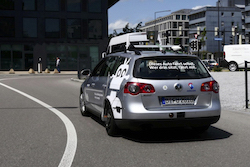An increase in the number of connected cars on the roads could have “grave implications” for mobile networks unless appropriate measures are taken, a new study has revealed.
According to a report from Machina Research, a sharp increase in M2M traffic during rush hour will put a massive strain on network cells, some of which will experience a 97 percent increase in data traffic in the next 10 years.
The study, commissioned by network assurance and analytics firm TEOCO, said that while M2M traffic doesn’t consume high volumes of data, it has different demands to that of tablets and smartphones.
Matt Hatton, founder and CEO of Machina Research, said M2M traffic from connected cars will fluctuate greatly depending on the time of day, meaning it presented “a very diverse set of challenges” to network operators.
Hatton said: “In terms of overall data volumes, connected cars don’t present much of a problem. But network resource management is not based on total traffic volume, it’s based on particular cell sites during peak times of network use.
“If connected cars regularly cause network traffic spikes in a particular location that can’t be met, there are implications for operators in meeting SLAs and delivering a positive quality of experience.”
The report concluded that mobile operators will have to make “special plans” to ensure their networks could accommodate new demands from M2M traffic.
According to Machina, operators need to adopt “dynamic” network management and radio access network optimisation in order to cope with the varying demands of different devices connected to their networks. They also need to be suitably prepared to facilitate inter-connections between access networks across both licensed and unlicensed spectrum, the report said.
It also highlighted the need for operators to focus on device management, including the introduction of “robust” certification processes and service assurance capabilities for the influx of new device connections.
A new approach to spectrum farming and “more sophisticated” backhaul planning tools were also identified by the report.
Steve Bowker, VP Technology and Strategy at TEOCO, said: “The connected car is just one of many M2M use cases that will put new and unusual demands on network usage that mobile operators will need to resolve.
“In all cases, operators will need to identify where and when the network traffic is generated, measure the volume, and analyse the type of traffic as well. They’ll need to more seriously consider how to cope with these demands for reduced latency, higher bandwidth, more signalling and higher QoS.
“This requires a more sophisticated and comprehensive approach to mobile network planning.”
Meanwhile, Ericsson revealed it was working with Volvo to implement the car manufacturer’s ITS4Mobility intelligent transport system in Latin America.
Ericsson will customise Volvo’s system with traffic management and passenger information capabilities that address the specific needs of the Latin American market.
Read more:
Swisscom gets into gear with country’s first driverless car
Mobile data traffic to hit 197,000 petabytes by 2019, mainly offloaded to Wi-Fi



